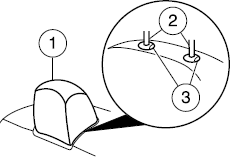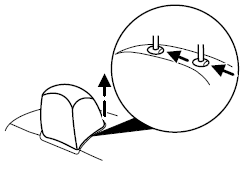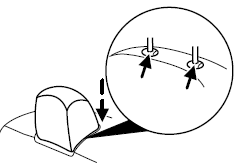Second-row non-adjustable head restraints

Your vehicle is equipped with second row outboard head restraints that are non-adjustable.
WARNING: To minimize the risk of neck injury in the event of a crash, the driver and passenger occupants should not sit in and/or operate the vehicle, until the head restraint is placed in its proper position. The driver should never adjust the head restraint while the vehicle is in motion.
The non-adjustable head restraints consist of:
• a trimmed energy absorbing foam
and structure (1),
• two steel stems (2),
• and two guide sleeve
unlock/remove buttons (3).

To remove the non-adjustable head restraint, do the following:
1. Simultaneously press and hold both unlock/remove buttons, then pull up on the head restraint.

To reinstall the non-adjustable head restraint, do the following:
1. Insert the two stems into the
guide sleeve collars.
2. Push the head restraint down
until it locks.

WARNING: The non-adjustable head restraint is a safety device.
It should be installed whenever the seat is occupied.
WARNING: To minimize the risk of neck injury in the event of a crash, head restraints must be installed properly.
See also:
Cleaner air
Ford endorses the use of reformulated “cleaner-burning” gasolines to
improve air quality, per the recommendations in the Choosing the right
fuel section. ...
Airbag supplemental restraint system (SRS)
The airbag supplemental restraint system (SRS) is designed to work in
conjunction with the safety belts to help protect the driver and front
outboard passenger from certain upper body injuries. ...
Additional assistance
If you have questions or concerns, or are unsatisfied with the service you
are receiving, follow these steps:
1. Contact your Sales Representative or Service Advisor at your
selling/servicing aut ...
